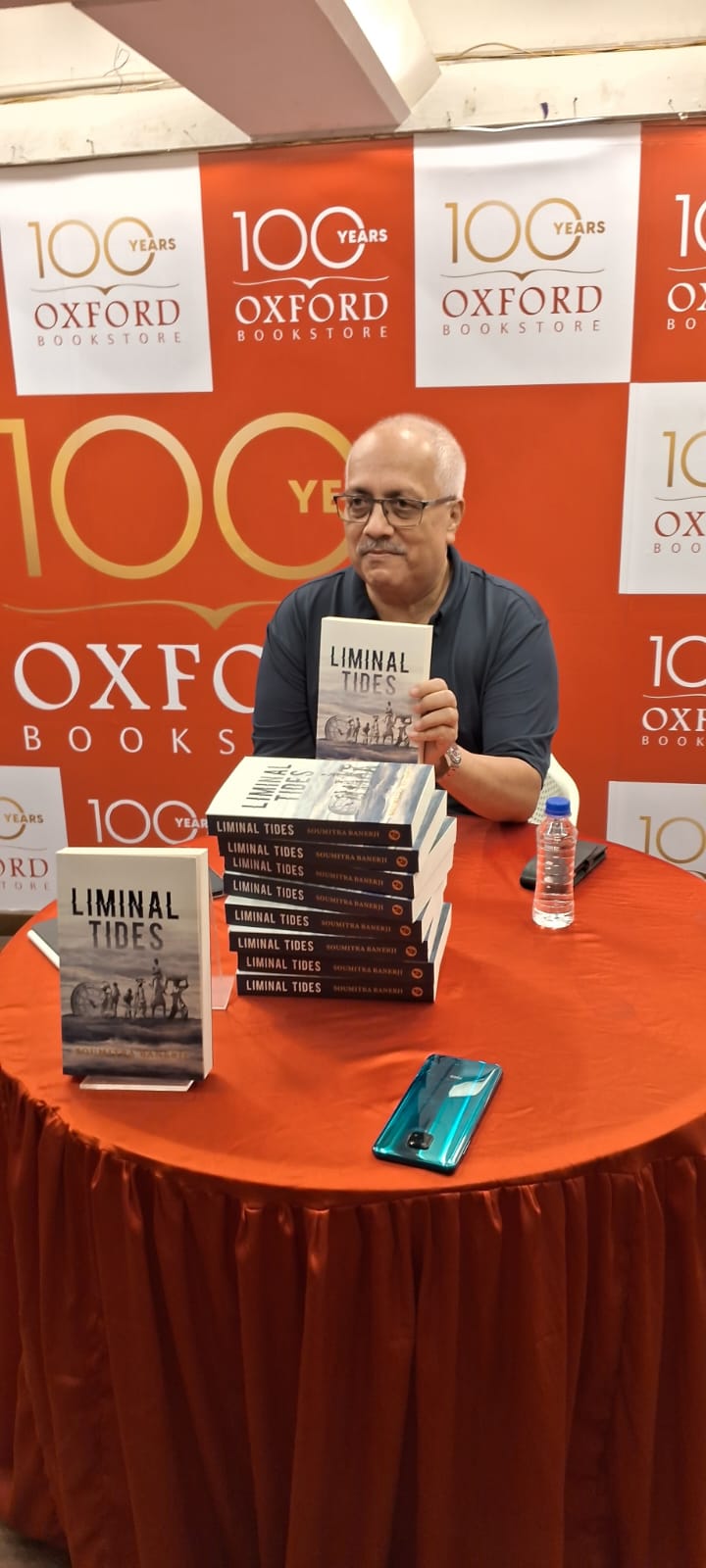Liminal Tides
Liminal Tides is the debut novel by Soumitra Banerjee, set against the backdrop of India’s Partition
THC Bureau | August 25, 2024 5:50 pm

Liminal Tides is the debut novel by Soumitra Banerjee, set against the backdrop of India’s Partition. Flourishing businesses of the Hindus in Sialkot fell prey to the Muslims as the inevitable approached. The sporting businesses, which manufacturing cricket and hockey gears, were in the hands of Hindus; Muslim workers were employed in these factories. Demand for the cricketing gear was skyrocketing when Mulk Raj Khanna in Sialkot finally realized that he would have to leave Sialkot, as his cousin, Sanjay Kapoor, was lynched in an act of intimidation, for he had refused to sell his sporting assets at a throwaway price. Yet, Khanna also found solace in his friendship with a Muslim client, who eventually worked out his escape from Sialkot, while also ensuring that the market prices of the assets and properties were paid to the Hindu businessman, which was to be arranged after the Partition.
Following is an excerpt from Liminal Tides, published by The Browser:
The road to Narowal was not one of the best. The good stretches had potholes staring up at periodical intervals. Some were positioned such that the vehicle had no other choice but to befriend them, with jolts, thuds, and all kinds of creaking noises characteristic of a senior automobile. Mulk was looking out to see whatever he could through the dim headlights of the bus on a full moon night. His lap was over occupied with a cloth bag stuffed to the fullest. The same was the case with Magan. The contents were variegated… ranging from documents to artifacts. What both were worried about was the gold and cash at the bottom of the pile in each bag. There were four trunks in the bus’s hold that contained all the clothes and household items, again with precious items at the bottom of each trunk. Over and above this, both Mulk and Magan had small cloth bags strapped around their waists, containing cash. This would help them during their long passage to Agra, via Amritsar.
They had not taken the Jammu and Kud route on account of heavy rioting and violence throughout that way. When Mulk and Aftab had gone to enquire about the busses and their departure timings, they were shocked at the macabre sight they saw there. It was total chaos with dead bodies, grievously injured, and shocked refugees all around, and police, doctors and paramedics wading through them. A huge crowd was looking on as if it was a free show till they were pushed out by the police charging at them in intervals.
There were busses coming from Jammu and near about, including Kud, with massacred passengers. Similar was the situation of the passengers moving out from Sialkot and the vicinity. It was an insane, illiterate, and barbaric act of revenge, one following the other, not knowing the starting point. A clerk at the bus stand, known to Mulk, had told them that this carnage had been going on for the last couple of days. It was not only hatred that was the cause. More than that, it was the opportunistic looting of valuables from the passengers that followed. Human greed and avarice were the cause of what was being attributed to the senseless political decision to split the country.
A shiver had gone down Mulk’s spine, and Aftab had sensed it. He had put a hand on Mulk’s shoulder and guided him out of the gory site. Mulk had been in convulsions as he walked along with Aftab. ‘What is going to happen to us, and our belongings… I can clearly see a scattered family… there is no way that we all can get back together… I will be killed here, along with Magan… Jai would not know any of our whereabouts, being far off in England… Jaya and his entire household would be all by themselves, with at least Hans Raj to protect them… Mulk had gone on rattling off while sobbing profusely, and Aftab did nothing more than try to console and steady him. He had understood that Mulk’s vision and feelings were not far from the reality of the bad times that had befallen him and his family, and like him, on the multitudes in both the communities, for no fault of theirs.
Aftab was a good Muslim and a gem of a human being. He had resolved not to let any of this happen to at least his friend… his brother-in-arm. Having dropped Mulk at his Sialkot residence, Aftab had ventured off to make arrangements for Mulk’s departure to Indian territory after Radcliffe’s partition was made known officially. On returning, Aftab seemed to be a more satisfied man than when he had gone off. He was accompanied by Aslam. ‘Mulk bhai, here are your and Magan’s bus tickets to Narowal. From there, you will be crossing the Ravi River by ferry to Dera Baba Nanak and taking a bus or ride to Amritsar via Ajnala. From whatever information I could gather, you should be safe once you reach Dera Baba Nanak. Once in Amritsar, you can make enquiries about the whereabouts of the rest of the family and, Insha Allah, you would be able to travel together as a family to Agra. I am sure. Mulk bhai, the bus journey from here onwards will not be easy. So please take proper care of yourself and your belongings, despite the support you would be getting from my acquaintances. Anyway, it would be far safer than going to Kud, as the situation is now.’
(Excerpt has been published with prior permission from the publisher, The Browser)































